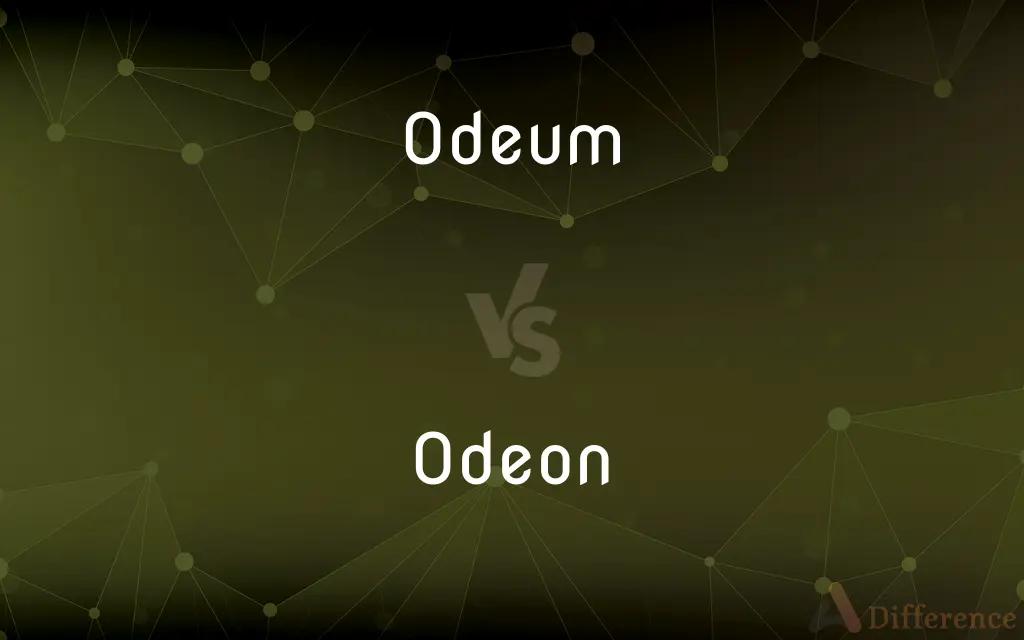Odeum vs. Odeon — What's the Difference?
By Maham Liaqat & Fiza Rafique — Updated on May 17, 2024
"Odeum" is a term for an ancient Greek or Roman building used for musical performances and public events, while "Odeon" refers to both ancient theaters and modern cinemas or concert halls named after these historic structures.

Difference Between Odeum and Odeon
Table of Contents
ADVERTISEMENT
Key Differences
"Odeum" refers specifically to ancient Greek or Roman buildings designed for musical performances, poetry readings, and other public events. These structures were often covered and smaller than open-air theaters, providing a more intimate setting for artistic performances. "Odeon" can refer to ancient theaters similar to odeums but is also commonly used in modern times to denote cinemas or concert halls named in homage to these historical venues. The term has been adopted to signify places where performances or screenings occur, blending historical significance with contemporary usage.
"Odeum" emphasizes its historical context, focusing on its role in ancient culture and architecture. It is a term that evokes the classical traditions of performance spaces in ancient Greece and Rome. "Odeon," while it shares historical roots, has a broader application in modern language. It can refer to the same ancient structures as odeums but is more frequently used to describe modern theaters and cinemas that adopt the name to evoke a sense of cultural heritage.
In historical studies, "odeum" is used to discuss the specifics of ancient performance spaces, while "odeon" might be used to connect those ancient practices to contemporary cultural venues.
Comparison Chart
Definition
Ancient Greek/Roman building for musical performances
Ancient theaters, modern cinemas, or concert halls
Historical Context
Specifically ancient Greek or Roman
Both ancient and modern contexts
ADVERTISEMENT
Modern Usage
Rare, mostly historical discussions
Common, refers to cinemas/theaters
Size and Structure
Typically smaller, covered buildings
Varies, from small to large venues
Example Sentence
E.g., "The odeum hosted poetry readings in ancient Greece."
E.g., "We went to the Odeon to watch the latest movie."
Compare with Definitions
Odeum
An ancient Greek or Roman building used for musical performances and public events.
The odeum in Athens was a center for artistic performances.
Odeon
An ancient Greek or Roman theater, similar to an odeum.
The odeon in Epidaurus was renowned for its architecture.
Odeum
Historically significant buildings for cultural events in ancient Greece and Rome.
The odeum's acoustics were designed to enhance musical performances.
Odeon
A venue for cultural performances, both historical and contemporary.
The local Odeon hosts concerts and film screenings.
Odeum
A covered theater in classical antiquity, smaller than an open-air theater.
Archaeologists discovered the ruins of an odeum near the ancient agora.
Odeon
A modern cinema or concert hall named after the ancient theaters.
We visited the Odeon to watch a new film.
Odeum
A place for public gatherings and entertainment in classical civilizations.
Citizens gathered at the odeum for various public events.
Odeon
A place where artistic performances are held, inspired by classical tradition.
The Odeon theater in our city is a popular venue for plays.
Odeum
A venue for poetry readings and recitals in ancient times.
The odeum provided an intimate setting for the poet's recital.
Odeon
A term used for theaters that evoke the cultural heritage of ancient Greece and Rome.
The Odeon cinema chain is named after the historic odeons.
Odeum
A small building of ancient Greece and Rome used for public performances of music and poetry.
Odeon
An ancient Greek or Roman building used for performances of music and poetry.
Odeum
A contemporary theater or concert hall.
Odeon
A theatre or concert hall.
Odeum
Alternative form of odeon
Odeon
A kind of theater in ancient Greece, smaller than the dramatic theater and roofed over, in which poets and musicians submitted their works to the approval of the public, and contended for prizes; - hence, in modern usage, the name of a hall for musical or dramatic performances.
Odeum
See Odeon.
Common Curiosities
Are "odeum" and "odeon" used interchangeably?
Historically, they can be similar, but "odeon" is more commonly used in modern contexts.
What does "odeon" mean?
It can refer to ancient theaters similar to odeums and modern cinemas or concert halls.
Can "odeon" refer to ancient buildings?
Yes, it can refer to ancient theaters.
What is the modern use of "odeon"?
It is often used to name cinemas or concert halls.
Is "odeum" still used today?
Rarely, mostly in historical or archaeological contexts.
What does "odeum" mean?
It refers to an ancient Greek or Roman building used for musical performances and public events.
Do odeums still exist?
The structures remain as historical sites and ruins.
What architectural features distinguish an odeum?
Covered seating areas, designed for acoustics, typically smaller than open-air theaters.
Do "odeum" and "odeon" differ in size?
Odeums were typically smaller and covered, while odeons vary in size.
What type of events were held in an odeum?
Musical performances, poetry readings, and public events.
Can "odeon" be used to describe any modern theater?
Generally, it refers to specific venues named Odeon.
Are there famous odeons today?
Yes, many cinemas and concert halls use the name Odeon.
Why are modern theaters called Odeon?
To evoke a sense of cultural heritage and connection to classical traditions.
Do odeons have any special cultural significance?
Yes, they symbolize a connection to ancient cultural practices and performance arts.
Are odeums found outside Greece and Rome?
Primarily in regions influenced by Greek and Roman culture, but similar concepts exist globally.
Share Your Discovery

Previous Comparison
Entrails vs. Intestines
Next Comparison
Food vs. FareAuthor Spotlight
Written by
Maham LiaqatCo-written by
Fiza RafiqueFiza Rafique is a skilled content writer at AskDifference.com, where she meticulously refines and enhances written pieces. Drawing from her vast editorial expertise, Fiza ensures clarity, accuracy, and precision in every article. Passionate about language, she continually seeks to elevate the quality of content for readers worldwide.
















































